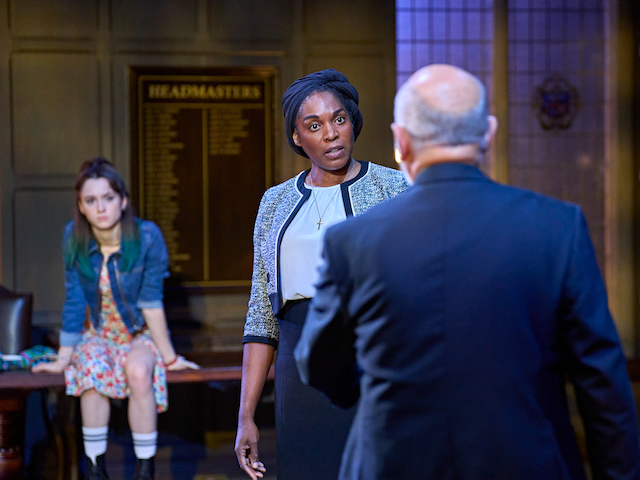Hell hath no fury like a teenager scorned. In this perplexing play, we see a highly successful doctor put on trial by his rebellious 18-year-old daughter and found miserably wanting. Ibsen’s influence hangs heavily over an evening in which Sir Neil Marriot throws a party to celebrate his new knighthood and his birthday, only to find that elements of his past are hiding in the panelled dining room waiting to challenge him. As a result it ends up being an evening of sound and fury – though what it signifies is anyone's guess.
It’s a red herring that the acclaimed director Richard Eyre’s first original play features a doctor who – as the publicity puts it – has had a good pandemic. The multiple moral questions raised by Covid are barely touched on here. The point is more that this man’s public reputation appears beyond reproach; he is, as Ibsen might have put it, a pillar not just of a community but an entire nation. Yet when you spend your entire career involved in decisions that can make the difference between life and death, sometimes you make mistakes; the question is whether this is a sign of fallibility or evil.
The narrative in which a successful paterfamilias is brought to his knees by revelations of hypocrisy and corruption from the past underpins dramas as diverse as Ibsen’s Pillars of the Community, Arthur Miller’s All My Sons and Thomas Vinterberg’s Festen. Yet in all these scripts the evidence against the father is utterly damning. In The Snail House the case is full of holes.
The initial charges come from his 18-year-old daughter Sarah (a vividly petulant Grace Hogg-Robinson) and his 25-year-old son, Hugo. Sarah, in particular, seems to see herself as a victim of her father’s failure to understand her. They discuss the fact that Neil is a celebrated paediatrician but has no real idea how to handle his own children. “[We] were like expensive toys,” says Hugo, “he loved playing with us for a while, then we got broke or he got bored.”/ “Funny he was so good at treating children and so hopeless with us,” Sarah replies.
 Yet against the backdrop of Tim Hatley’s panelled Harry-Potter-worthy school-dining-room set, a far more serious allegation is about to emerge. Florence, played with warm dignity by Amanda Bright (pictured above, centre), is the catering manager whose life has been blighted more than a decade beforehand by medical evidence provided in court by Marriott. The allegation is extremely serious; but it just takes a swift check on Google for Sarah to decide the case against her father is strong enough to humiliate him in front of his friends. The question is whether he will own up and apologise for his past.
Yet against the backdrop of Tim Hatley’s panelled Harry-Potter-worthy school-dining-room set, a far more serious allegation is about to emerge. Florence, played with warm dignity by Amanda Bright (pictured above, centre), is the catering manager whose life has been blighted more than a decade beforehand by medical evidence provided in court by Marriott. The allegation is extremely serious; but it just takes a swift check on Google for Sarah to decide the case against her father is strong enough to humiliate him in front of his friends. The question is whether he will own up and apologise for his past.
Vincent Franklin (pictured above, right) plays Neil as a flawed figure who is neither particularly likeable or dislikeable. There are moments when he sounds glib and patronising – not least when talking about his daughter going on political protests – but most of the time he appears both aware of and responsive to criticism from his family. Both his right-wing gay son (played with charismatic warmth by Patrick Walshe McBride) and his daughter accuse him of insensitivity to who they are. Yet their characters are far too narrowly sketched, so it’s difficult to see that he’s been much worse than any parent who’s struggled with the balance between letting his children be what they want to be and who he expects them to be.
Eyre, who also directs, has put his central character in the dock, but unlike Ibsen, Miller and Vinterberg, gives him ample evidence to get out. We’re given a striking example, for instance, of the huge good he has done working with children in Romanian orphanages after the fall of the Berlin Wall. While the mistake that’s revealed is serious – and one that merits an entire play on its own – his argument that he was acting as responsibly as he could with the available information is credible. Yes, it’s right that he should apologise, but he’s clearly passionate and conscientious about his job; the fact that he allows his daughter to become his chief prosecutor on the basis of her cursory internet search is baffling.
The upshot is that you emerge feeling very confused. Is this an exceptionally rare occasion of too much white male guilt? Or a play which is missing crucial information? Or maybe a play that should have been another one, two or indeed three separate plays entirely?
Eyre – a sensitive and skilled adaptor of other works – ensures that the performances are high quality and the chemistry between the characters credible. Megan McDonnell is particularly worthy of mention as the Irish catering assistant who sings everything from Diana Ross to Billie Eilish. Yet while this play bares its teeth at a whole range of issues, ultimately it fails to bite.















Add comment